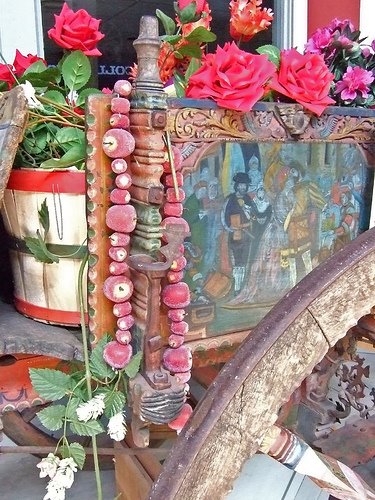For those of you who are interested in the subterfuge of history, and in particular, the "Great Game" [ http://en.wikipedia.org/wiki/The_Great_Game ] of the 19th Century, you will be fascinated by the story of the underwater volcano just discovered off the coast of Sicily
In 1831 a small piece of black rock was raised to the surface of the sea from a submerged volcanic after a series of earthquakes in Sicily. As it was more strategically located closer to France and Spain, that its then current possession, Malta was, the British upon hearing of this island birth, sent a navy flotilla to claim the piece of sulphur for Queen Victoria. They named the island, "Graham", how quaint. Either the name, "Graham", or the pure insolence of the British very much annoyed King Ferdinand, the Bourbon King of the Two Sicilies, that he countered by sending his own troupe of soldiers to replace the British flag with his and to rechristen the lump of smouldering ash as "Ferdinandea". Modest was certainly not a virtue in his court.
The French, not wanting to miss such a juicy piece of hardcore lava action duly sent a team of geologist to claim the island in the name of science, and to give it a nice French sounding name, "Giulia"; how sweet a name for such a pungent piece of sulphur (it makes is difficult to look at any girl called Giulia again in the same way). Finally, just as the Spanish were preparing for an all out ground assault, the smoking black rock sank back into the sea.
Why is this story relevant today, you may ask? Well a team of Italian scientists have just discovered that Graham Ferdinandea Giulia is actually a smaller outpost of a much larger, volcano that is comparable is mass to the grandaddy of them all, Etna. The scientists say that, although the underwater volcano is still active, it doesn't pose any threat today. Tell that to Blair, Prodi and Chirac - who have their marines on 24/7 standby just waiting for it to pop its head just a little above sea level.
http://news.independent.co.uk/europe/article1096040.ece
In 1831 a small piece of black rock was raised to the surface of the sea from a submerged volcanic after a series of earthquakes in Sicily. As it was more strategically located closer to France and Spain, that its then current possession, Malta was, the British upon hearing of this island birth, sent a navy flotilla to claim the piece of sulphur for Queen Victoria. They named the island, "Graham", how quaint. Either the name, "Graham", or the pure insolence of the British very much annoyed King Ferdinand, the Bourbon King of the Two Sicilies, that he countered by sending his own troupe of soldiers to replace the British flag with his and to rechristen the lump of smouldering ash as "Ferdinandea". Modest was certainly not a virtue in his court.
The French, not wanting to miss such a juicy piece of hardcore lava action duly sent a team of geologist to claim the island in the name of science, and to give it a nice French sounding name, "Giulia"; how sweet a name for such a pungent piece of sulphur (it makes is difficult to look at any girl called Giulia again in the same way). Finally, just as the Spanish were preparing for an all out ground assault, the smoking black rock sank back into the sea.
Why is this story relevant today, you may ask? Well a team of Italian scientists have just discovered that Graham Ferdinandea Giulia is actually a smaller outpost of a much larger, volcano that is comparable is mass to the grandaddy of them all, Etna. The scientists say that, although the underwater volcano is still active, it doesn't pose any threat today. Tell that to Blair, Prodi and Chirac - who have their marines on 24/7 standby just waiting for it to pop its head just a little above sea level.
http://news.independent.co.uk







No comments:
Post a Comment